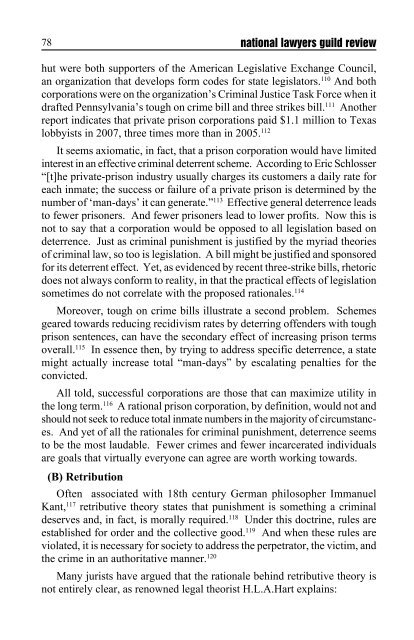Does your library have National Lawyers Guild Review?
Does your library have National Lawyers Guild Review?
Does your library have National Lawyers Guild Review?
Create successful ePaper yourself
Turn your PDF publications into a flip-book with our unique Google optimized e-Paper software.
78 national lawyers guild reviewhut were both supporters of the American Legislative Exchange Council,an organization that develops form codes for state legislators. 110 And bothcorporations were on the organization’s Criminal Justice Task Force when itdrafted Pennsylvania’s tough on crime bill and three strikes bill. 111 Anotherreport indicates that private prison corporations paid $1.1 million to Texaslobbyists in 2007, three times more than in 2005. 112It seems axiomatic, in fact, that a prison corporation would <strong>have</strong> limitedinterest in an effective criminal deterrent scheme. According to Eric Schlosser“[t]he private-prison industry usually charges its customers a daily rate foreach inmate; the success or failure of a private prison is determined by thenumber of ‘man-days’ it can generate.” 113 Effective general deterrence leadsto fewer prisoners. And fewer prisoners lead to lower profits. Now this isnot to say that a corporation would be opposed to all legislation based ondeterrence. Just as criminal punishment is justified by the myriad theoriesof criminal law, so too is legislation. A bill might be justified and sponsoredfor its deterrent effect. Yet, as evidenced by recent three-strike bills, rhetoricdoes not always conform to reality, in that the practical effects of legislationsometimes do not correlate with the proposed rationales. 114Moreover, tough on crime bills illustrate a second problem. Schemesgeared towards reducing recidivism rates by deterring offenders with toughprison sentences, can <strong>have</strong> the secondary effect of increasing prison termsoverall. 115 In essence then, by trying to address specific deterrence, a statemight actually increase total “man-days” by escalating penalties for theconvicted.All told, successful corporations are those that can maximize utility inthe long term. 116 A rational prison corporation, by definition, would not andshould not seek to reduce total inmate numbers in the majority of circumstances.And yet of all the rationales for criminal punishment, deterrence seemsto be the most laudable. Fewer crimes and fewer incarcerated individualsare goals that virtually everyone can agree are worth working towards.(B) RetributionOften associated with 18th century German philosopher ImmanuelKant, 117 retributive theory states that punishment is something a criminaldeserves and, in fact, is morally required. 118 Under this doctrine, rules areestablished for order and the collective good. 119 And when these rules areviolated, it is necessary for society to address the perpetrator, the victim, andthe crime in an authoritative manner. 120Many jurists <strong>have</strong> argued that the rationale behind retributive theory isnot entirely clear, as renowned legal theorist H.L.A.Hart explains:












![NLGRev 68-2[1].indd - National Lawyers Guild](https://img.yumpu.com/30820772/1/167x260/nlgrev-68-21indd-national-lawyers-guild.jpg?quality=85)



